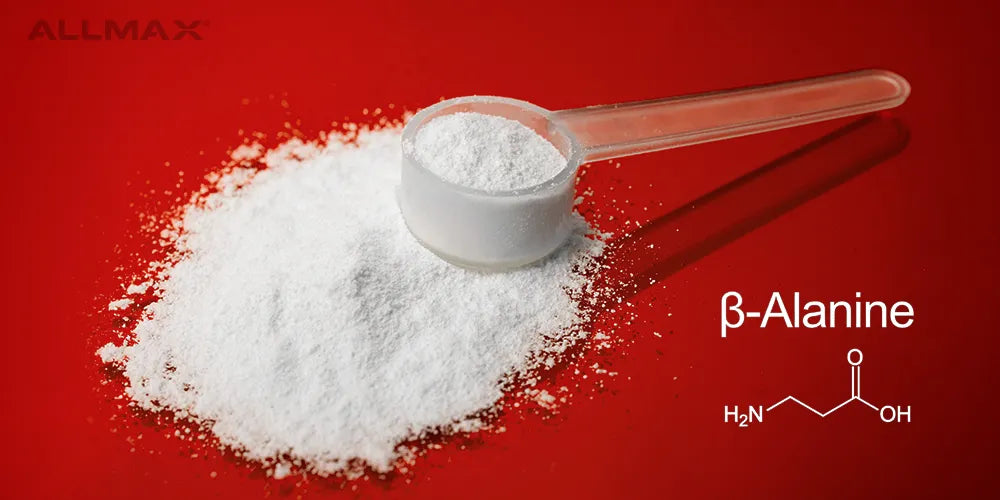Don’t sacrifice your training to muscle fatigue. Beta-alanine supplements can help you push through the burn, train harder, and maximize your athletic performance, especially during high-intensity exercise. By increasing your muscles’ natural buffering capacity, beta-alanine allows you to lift heavier, sprint faster, and perform at your best for longer. Whether you’re an athlete, fitness enthusiast, or weekend warrior, beta-alanine supports training intensity and endurance.
What is Beta-Alanine?
Beta-alanine is a naturally occurring amino acid that helps your body produce carnosine, a compound concentrated in skeletal muscles. Carnosine plays a key role in delaying muscle fatigue by buffering acid build-up, protecting cells from oxidative stress, regulating calcium in muscle fibers, and even helping reduce glycation. High carnosine levels in fast-twitch fibers make it especially important for explosive, high-intensity efforts.
Your body can only make a limited amount of carnosine, as the rate-limiting factor is the availability of beta-alanine. By supplementing, you can significantly increase carnosine levels in both upper and lower body muscles, enhancing your muscles’ ability to resist fatigue. This is why beta-alanine is widely recognized as one of the most effective ergogenic supplements for high-intensity training.
What Does Beta-Alanine Do?

During exercise, rising acidity in the muscles leads to lactic acid build-up, which contributes to cramping, burning, and fatigue. Normally, the body uses built-in chemical and physical buffers to delay this process, but under high-intensity conditions, these defenses are not enough. Carnosine acts as a powerful intracellular buffer that neutralizes excess acid, helping muscles perform longer before fatigue sets in.
Research suggests beta-alanine supplementation is most effective in exercise lasting 0.5 to 10 minutes, a timeframe where acidosis strongly contributes to fatigue and glycolytic energy pathways are heavily used. This makes it especially valuable for high-intensity training, interval work, and competitive sports requiring repeated bursts of effort.
Your body can only make a limited amount of carnosine, as the rate-limiting factor is the availability of beta-alanine. By supplementing, you can significantly increase carnosine levels in both upper and lower body muscles, enhancing your muscles’ ability to resist fatigue. This is why beta-alanine is widely recognized as one of the most effective ergogenic supplements for high-intensity training.
Effects and Benefits of Beta-Alanine Supplementation

Studies show that beta-alanine supplementation can increase muscle carnosine concentrations by 40–60%, with clear performance benefits:
Extended time to exhaustion during high-intensity efforts.
Increased strength and power output.
Reduced neuromuscular fatigue.
Improved exercise performance in both resistance and endurance training.
A four-week study reported a 13% increase in performance, with further gains observed after 10 weeks. Endurance athletes, including elite cyclists, have also shown improvements in ventilatory threshold and reduced fatigue when supplementing with beta-alanine.
Meta-analyses confirm that beta-alanine improves exercise capacity, particularly in efforts lasting 1–4 minutes, where acid accumulation plays a dominant role in limiting performance. Evidence for longer-duration exercise is more limited, but incremental protocols suggest some benefit in later stages of prolonged activity. Importantly, both trained and untrained individuals can experience improvements, though the magnitude may vary by fitness level and type of exercise.
Additionally, co-supplementation with sodium bicarbonate may enhance results by combining intracellular buffering (from increased carnosine) with extracellular buffering (from higher blood bicarbonate levels). This dual strategy has the potential to further delay fatigue compared to beta-alanine alone.
How to Take Beta-Alanine Effectively
The optimal daily dose is 6.4 g, divided into four servings of 1.6 g each. Mix in water or juice for easy intake. Some athletes prefer taking the full dose before workouts, but splitting it throughout the day helps minimize tingling sensations (paresthesia), a harmless side effect of high single doses.
Noticeable benefits often appear within the first week, while significant improvements in endurance and strength typically emerge after 3–4 weeks, as muscle carnosine levels rise. Consistency is key: daily supplementation ensures your muscles maintain elevated carnosine levels for optimal performance.
ALLMAX’s Beta-SYNTH™ is a hyper-micronized, pharmaceutical-grade beta-alanine processed through an 11-stage system to ensure maximum purity and absorption. Athletes report increased endurance within weeks, with long-term gains including heavier lifts, longer sprints, and better performance in repeated high-intensity efforts.
Bottom Line
Beta-alanine is a practical, evidence-based tool for athletes aiming to push past muscle fatigue. By increasing carnosine in muscles, it supports high-intensity performance, allowing you to train harder, recover faster, and achieve your goals. If you want to maximize every rep, sprint, and interval session, beta-alanine is a supplement worth adding to your routine.
References
- Saunders, B., Elliott-Sale, K., Artioli, G. G., Swinton, P. A., Dolan, E., Roschel, H., ... & Gualano, B. (2017). β-alanine supplementation to improve exercise capacity and performance: a systematic review and meta-analysis. British journal of sports medicine, 51(8), 658-669.
https://bjsm.bmj.com/content/bjsports/51/8/658.full.pdf - Artioli, G. G., Gualano, B., Smith, A., Stout, J., & Lancha Jr, A. H. (2010). Role of β-alanine supplementation on muscle carnosine and exercise performance. Medicine & science in sports & exercise, 42(6), 1162-1173.https://magistralbr.caldic.com/storage/product-files/1682737997.pdf
- Harris RC, Edge J, Kendrick IP, Bishop D, Goodman C, Wise JA: The Effect of Very High Interval Training on the Carnosine Content and Buffereing Capacity of V Lateralis from Humans. FASEB J 2007 , 21:769.
- Harris RC, Tallon MJ, Dunnett M, Boobis L, Coakley J, Kim HJ, Fallowfield JL, Hill CA, Sale C, Wise JA: The absorption of orally supplied beta-alanine and its effect on muscle carnosine synthesis in human vastus lateralis. Amino acids 2006 , 30(3):279-289.
- Hill CA, Harris RC, Kim HJ, Harris BD, Sale C, Boobis LH, Kim CK, Wise JA: Influence of beta-alanine supplementation on skeletal muscle carnosine concentrations and high intensity cycling capacity. Amino acids 2007 , 32(2):225-233.



